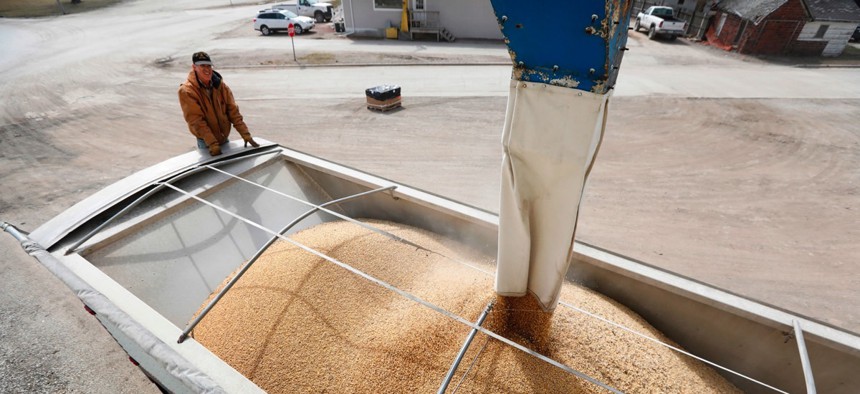Iowa Soybean Farmers Could Become the Face of a Trade War With China

Terry Morrison watches as soybeans are loaded into his trailer at the Heartland Co-op on April 5 in Redfield, Iowa. Charlie Neibergall / AP Photo
Already hit by falling agricultural commodity prices, retaliatory tariffs would effectively kick producers while they’re down.
Illinois might be the largest soybean producer in the U.S., but Iowa is the state most economically dependent on exports of the good to China, whose buyers are canceling orders.
Iowa’s soybean exports account for 6 percent of gross state product—4 percent to China alone—leaving the Hawkeye State the most exposed in a trade war.
For comparison, Missouri has the second-most exposure with soybean exports comprising a mere 1.8 percent of its GSP, according to Moody’s Investors Service:
In April, China canceled a net 196,400 metric tons of soybean purchases from the US for the marketing year ending August 31, 2018. While this is a small portion of the more than 30 million metric tons exported from the US to China in 2017, soy exports to China overall are down more than 20% this marketing year to date, according to US Department of Agriculture data. A lasting soybean boycott would reduce soybean prices overall as US producers seek buyers for their product, negatively affecting farm incomes.

Agricultural commodity prices falling 15 percentage points since 2013 saw Iowa farm income decline from 7 percent of state personal income to 1 percent.
Net general fund revenue growth in Iowa has gone from 7 percent in 2013 to 2 percent year over year, per Moody’s, and “overly optimistic” forecasts forced the state to tap into its rainy day fund and make $35 million in cuts this spring.
In the short term, the 25 percent tariff on soybeans China is threatening in retaliation for a slew of U.S. tariffs—imposed in an attempt to curb the nation-state’s theft of intellectual property and other hostile trade practices—won’t have a substantial impact on Iowa’s finances. But Commerce Secretary Wilbur Ross indicated at a Senate Appropriations hearing Thursday that “the gap is wide” between the two countries on bids and asks, meaning agricultural states could suffer further should trade tensions persist.
Dave Nyczepir is a News Editor at Government Executive’s Route Fifty and is based in Washington, D.C.
NEXT STORY: State Economic Growth Uneven Since Recession Began






